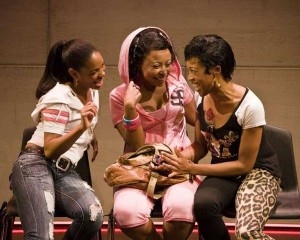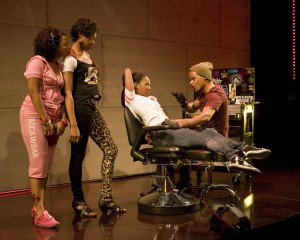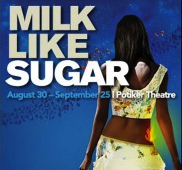UNLIKEABLE CHARACTERS STILL LEAVE A RESONATING MESSAGE
In Milk Like Sugar, Kirsten Greenidge’s sharply-written world premiere at La Jolla Playhouse, three African-American, inner-city high school girls, Annie, Margie, and Talisha (aka T), have formed a tight posse in order to survive the harsh realities of tenement life. With absent brothers and uneducated mothers (one of whom is played by Tonya Pinkins of Caroline, or Change) who are too tired to listen, these teenagers are left to make decisions based on their own frightening ignorance: since they can’t see a better life for themselves beyond the tenements, they resort to quick pleasures and pipe dreams.
 Newly pregnant Margie is convinced that she’ll be the perfect mother and that the child will, in return, bring her all the happiness her world lacks. A pact is quickly and casually reached that all three should get pregnant at the same time so they can all be happy together. But since neither Annie nor T has anyone special in their lives, the criteria used to choose the baby-daddy is based on how cute the guy is or who has the coolest cell phone. Although this situation may be typical in their world, it is horrifying to see how the potential fathers are essentially a means to an end rather than a partner in life (none of these girls should be responsible for a pet, let alone a child).
Newly pregnant Margie is convinced that she’ll be the perfect mother and that the child will, in return, bring her all the happiness her world lacks. A pact is quickly and casually reached that all three should get pregnant at the same time so they can all be happy together. But since neither Annie nor T has anyone special in their lives, the criteria used to choose the baby-daddy is based on how cute the guy is or who has the coolest cell phone. Although this situation may be typical in their world, it is horrifying to see how the potential fathers are essentially a means to an end rather than a partner in life (none of these girls should be responsible for a pet, let alone a child).
Annie picks Malik (J. Mallory-McCree) as a good sperm choice – although she has not spent any time with him, she feels he may even be good for her. Malik has a willingness to truly work toward dreams beyond the ghetto and he sees in Annie (as do we) more potential for success than her friends have. Because of the lack of role models who match any such impression of herself, Annie struggles with Malik’s message of hope. This conflict especially resonates when she dares express any higher visions to her clique.
Cherise Boothe’s performance as T was outstanding, creating a balance between pitying her and just wanting to get yourself (and Annie) away from her. Nikiya Mathis’ Margie struck a nice chord as the least sharp tool in the shed, trying to do the best she can with the little in her head (think a slightly more serious, poor, black 2011 version of Chrissy from Three’s Company). The audience is rooting for Annie (played with enjoyable gusto by Angela Lewis) but we do so apprehensively − because we know she could as easily let us down as reach for the stars.
Because the age of the girls is so significant to the piece, there is a serious loss of impact in casting women who looked years past sixteen. While the willing suspension of disbelief regarding age may be meaningless when viewing Hairspray or Footloose, in a show where we’re supposed to be horrified by estranged adolescence, these women all looked like they could be parents. Although the three actresses brought all that was needed to their roles, the impact and poignancy of the show would have been heightened had the actresses actually looked the tender age of sixteen.
The opening of the show was a struggle, as audience members were frequently leaning over to whisper, “What did she say?” Between the speed of the lines, the slang flying about, and the authentic inner-city intonation, this non-ghetto boy missed more than a few things that were going down between them, mirroring the same struggle to understand real-life youth. As the play progressed, it became easier to follow most of their banter, but the challenge at the onset prevents us from being drawn in.
 Under the sharp direction by Rebecca Taichman, the play’s heavy themes realistically convey the struggles of inner-city youth – ineffective role models and schools, faith distorting logic, instant gratification – but we spend a lot of time with characters we don’t particularly like: T is mean-spirited and a bully, Margie is self-centered and apathetic, and while we see glimmers of hope in our protagonist Annie, her ignorance and cold attitude is often frustrating. Therefore, this reviewer left the theater wondering if Milk Like Sugar was even an enjoyable experience. Upon reflection, however, the value of the production resonates more and more. This is a case where theatre is not about being fully entertained. Theatre becomes a cathartic and educational tool which reminds us that, while the Margies and Tanishas of the world may be beyond our reach, there are always Annies who need more than one passing Malik to become a valuable part of our society. For that reason alone, I am glad I saw it.
Under the sharp direction by Rebecca Taichman, the play’s heavy themes realistically convey the struggles of inner-city youth – ineffective role models and schools, faith distorting logic, instant gratification – but we spend a lot of time with characters we don’t particularly like: T is mean-spirited and a bully, Margie is self-centered and apathetic, and while we see glimmers of hope in our protagonist Annie, her ignorance and cold attitude is often frustrating. Therefore, this reviewer left the theater wondering if Milk Like Sugar was even an enjoyable experience. Upon reflection, however, the value of the production resonates more and more. This is a case where theatre is not about being fully entertained. Theatre becomes a cathartic and educational tool which reminds us that, while the Margies and Tanishas of the world may be beyond our reach, there are always Annies who need more than one passing Malik to become a valuable part of our society. For that reason alone, I am glad I saw it.
La Jolla Playhouse’s fare runs the gamut from the happy-go-lucky feel-good shows to some of the grittiest work in San Diego. Audiences who are holding their ticket money for escapist fare are encouraged to support this provocative outing, which just may inspire you to support our disaffected youth.
milo @ stageandcinema.com
Milk Like Sugar
scheduled to end on September 25
for tickets, visit http://www.lajollaplayhouse.org/
